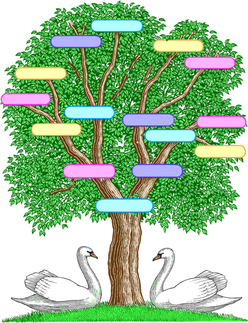Family Research 101
Hello and Welcome to our website! Please feel free to navigate the tabs at the top of the page to look around. You will need to put your mouse over 'more....' on the tabs above to find other tabs available underneath it. This site is fairly new, so please be patient as we add more information or change up some stuff now and then. In the meantime, just a few words.....
Nowadays, history research is easy. There are many websites that offer family database. After all, you have relatives whom you have never even heard of. The more you research your family's past, the larger your family becomes.
Do you know your genealogy history? If you are trying to fit together the pieces of your past, it helps to understand your family roots. You can learn about your family by researching and studying genealogy. To do this you must collect bits of information from reliable sources that you can use to trace your family line back through the generations. The easiest and least expensive way to get started is by using a free genealogy website.
Thanks to the internet, anyone can research genealogy history. At one time, family research was a daunting task. It entailed long distance travel and digging through old records in libraries and other repositories. Thankfully today, all of that data is available at the click of a mouse and for free. However, to get the best results, you need to work with a reliable and accurate website. You should learn about the various search techniques and the documents you’re likely to encounter.
One important thing to remember is to keep highly detailed notes as you go about your genealogy history research. You may run across an important detail that proves to be vital at a later time. If you rely upon your memory, you may miss out on a clue that allows the pieces of your past to fall into place. Keep track of website addresses, data, and significant information. Don't use abbreviations that you might not understand later. Print out the historical documents that pertain to your family. These documents could be the key to resolving conflicting information that pops up during your research.
Don't forget that your living relatives can be a great source of information too. They can verify facts you uncover and tell you details that lead you down the right path on your research. Record the stories of your older relatives before they pass away so that they can be handed down to future generations.
Some databases you can search through online are census records, obituaries, death indexes, and other public records. Many newspapers publish death notices have been archived. You can search through old papers and find important information like the names of relatives and birth and death dates. You’ll run across all kinds of data when you do genealogy history research. Staying organized is important so that you can find significant documents when you need them.
Threading the information together is a laborious task but when you have one branch of your tree completed and verified, then you’re ready to begin on the next. When you complete an area of research, you should share your findings with other researchers. You may have distant relative searching for the information you have and they may be able to assist your efforts too.
Nowadays, history research is easy. There are many websites that offer family database. After all, you have relatives whom you have never even heard of. The more you research your family's past, the larger your family becomes.
Do you know your genealogy history? If you are trying to fit together the pieces of your past, it helps to understand your family roots. You can learn about your family by researching and studying genealogy. To do this you must collect bits of information from reliable sources that you can use to trace your family line back through the generations. The easiest and least expensive way to get started is by using a free genealogy website.
Thanks to the internet, anyone can research genealogy history. At one time, family research was a daunting task. It entailed long distance travel and digging through old records in libraries and other repositories. Thankfully today, all of that data is available at the click of a mouse and for free. However, to get the best results, you need to work with a reliable and accurate website. You should learn about the various search techniques and the documents you’re likely to encounter.
One important thing to remember is to keep highly detailed notes as you go about your genealogy history research. You may run across an important detail that proves to be vital at a later time. If you rely upon your memory, you may miss out on a clue that allows the pieces of your past to fall into place. Keep track of website addresses, data, and significant information. Don't use abbreviations that you might not understand later. Print out the historical documents that pertain to your family. These documents could be the key to resolving conflicting information that pops up during your research.
Don't forget that your living relatives can be a great source of information too. They can verify facts you uncover and tell you details that lead you down the right path on your research. Record the stories of your older relatives before they pass away so that they can be handed down to future generations.
Some databases you can search through online are census records, obituaries, death indexes, and other public records. Many newspapers publish death notices have been archived. You can search through old papers and find important information like the names of relatives and birth and death dates. You’ll run across all kinds of data when you do genealogy history research. Staying organized is important so that you can find significant documents when you need them.
Threading the information together is a laborious task but when you have one branch of your tree completed and verified, then you’re ready to begin on the next. When you complete an area of research, you should share your findings with other researchers. You may have distant relative searching for the information you have and they may be able to assist your efforts too.
Thanks for stopping by! Where our visitors are from:


